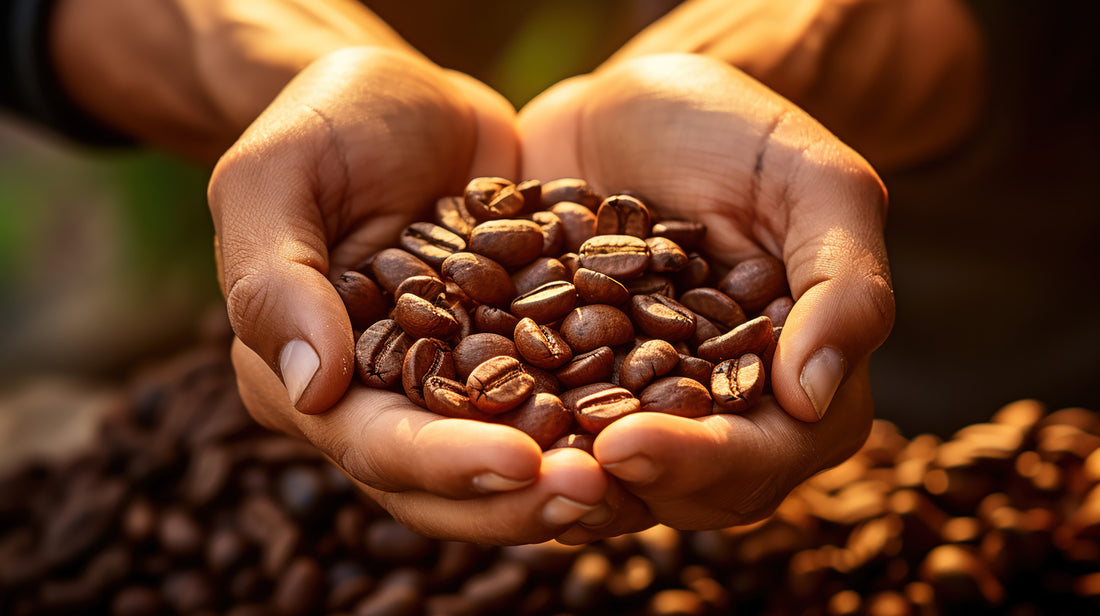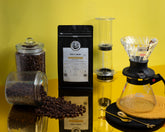When it comes to coffee, the debate between Robusta and Arabica beans has been ongoing for years. Each type of coffee bean offers distinct characteristics, flavors, and benefits that appeal to different palates and preferences. As a Direct Origin Coffee Roaster, we are deeply committed to providing high-quality coffee sourced directly from farmers, and we understand the importance of selecting the right type of bean. In this article, we will delve into the key differences between Robusta and Arabica, exploring whether Robusta truly holds an edge over Arabica.
1. Understanding Robusta and Arabica: The Basics
1.1 What is Robusta?
Robusta (Coffea canephora) is a coffee variety that originates from central and western sub-Saharan Africa. It is known for its strong, bold flavor and higher caffeine content compared to Arabica. Robusta beans are typically rounder, smaller, and more robust, hence the name. They thrive at lower altitudes and are more resistant to pests and diseases, making them easier to cultivate in a variety of climates.
1.2 What is Arabica?
Arabica (Coffea arabica) is the most popular coffee variety worldwide, accounting for approximately 60-70% of global coffee production. Originating from the highlands of Ethiopia, Arabica beans are known for their smooth, mild flavor and aromatic qualities. Arabica beans are generally oval-shaped with a curved crease, and they grow best at higher altitudes in cooler climates.
2. Flavor Profile: Robusta vs. Arabica
2.1 The Boldness of Robusta
Robusta beans are characterized by their strong, bitter flavor with nutty and earthy undertones. The high caffeine content in Robusta beans (approximately 2.2-2.7%) contributes to its robust taste and gives it a slightly harsher mouthfeel. This bold flavor profile is often favored by those who prefer a more intense coffee experience, such as in espresso blends or dark roasts. Additionally, Robusta beans are known for producing a rich crema, which is a desired quality in espresso.
2.2 The Delicacy of Arabica
Arabica beans, on the other hand, offer a smoother, more nuanced flavor profile. With a lower caffeine content (around 1.2-1.5%), Arabica coffee is often described as having sweet, fruity, and floral notes, with a delicate acidity. The complexity of flavors in Arabica coffee makes it a favorite among connoisseurs and those who appreciate a lighter, more refined cup of coffee. Arabica beans are often used in specialty coffee due to their ability to highlight the unique characteristics of the region where they are grown.
3. Growing Conditions and Production
3.1 Robusta’s Resilience
One of the key advantages of Robusta beans is their resilience. Robusta coffee plants are hardier, requiring less care and attention compared to Arabica plants. They can withstand higher temperatures, lower altitudes, and are more resistant to pests and diseases. This resilience makes Robusta beans more affordable to produce and generally results in a lower market price. However, the ease of cultivation does not necessarily translate to superior quality, and many consider Robusta to be of lower quality compared to Arabica.
3.2 The Challenges of Arabica
Arabica coffee plants are more delicate and require specific growing conditions to thrive. They prefer cooler temperatures, higher altitudes, and well-drained, fertile soil. Arabica plants are also more susceptible to pests, diseases, and environmental changes, making them more challenging and costly to cultivate. Despite these challenges, the effort to grow Arabica beans is often rewarded with a higher quality product that is highly sought after in the coffee industry.
4. Health Benefits: Caffeine Content and Antioxidants
4.1 The Perks of Robusta
Robusta beans are often touted for their higher caffeine content, which not only contributes to their bold flavor but also provides a stronger energy boost. Caffeine is a natural stimulant that can improve focus, increase alertness, and enhance physical performance. Additionally, Robusta coffee contains more chlorogenic acid, a powerful antioxidant that may offer health benefits such as reducing inflammation and improving cardiovascular health.
4.2 The Advantages of Arabica
While Arabica beans contain less caffeine, they still provide a moderate energy boost without the potential side effects of higher caffeine intake, such as jitteriness or insomnia. Arabica coffee is also rich in antioxidants, particularly polyphenols, which are known to have protective effects against chronic diseases. The lower acidity of Arabica coffee makes it gentler on the stomach, which may be beneficial for individuals with sensitive digestive systems.
5. Market Perception and Popularity
5.1 Robusta’s Market Niche
Robusta beans have carved out a niche in the market, particularly in instant coffee and espresso blends. Their strong flavor and rich crema make them a popular choice for espresso lovers who seek a bold, intense coffee experience. However, Robusta’s reputation for being less refined than Arabica has led to a perception of it being a lower-quality option, which is reflected in its lower price point.
5.2 Arabica’s Reign
Arabica beans dominate the global coffee market, particularly in the specialty coffee sector. The demand for high-quality, single-origin Arabica coffee has led to a growing appreciation for its complex flavors and aromatic qualities. Arabica coffee is often associated with premium brands and is favored by coffee enthusiasts who prioritize quality and flavor over price. This strong market preference for Arabica has solidified its position as the superior coffee variety in the eyes of many consumers.
6. Conclusion: Is Robusta Really Better Than Arabica?
While the debate between Robusta and Arabica often centers around taste and quality, it's important to highlight that Robusta coffee offers notable health benefits due to its higher caffeine content. One of the key advantages is its ability to stimulate the release of adrenaline, a hormone that enhances physical performance and boosts energy levels. This makes Robusta coffee an excellent choice for those who need an extra kick to stay alert and active throughout the day. Additionally, the higher caffeine content in Robusta can aid in improving focus and increasing metabolic rate, supporting overall health and well-being.
When it comes to flavor, Robusta is often misunderstood. Contrary to the common misconception that it has a sharp, bitter taste, Robusta coffee actually boasts a rich flavor profile that includes notes of dark chocolate, nuts like almonds, and even whiskey. These flavors contribute to a bold, full-bodied coffee experience that many coffee enthusiasts appreciate. The rumors of Robusta being overwhelmingly bitter are misleading and do not accurately reflect the complexity and depth of its taste.
Despite its benefits, Robusta coffee often gets a bad reputation in the U.S. market. Many experts agree that Robusta is the best and can even be better than Arabica in some ways, but the U.S. market usually favors Arabica and gives Robusta a less positive image. This bias can cause people to misunderstand Robusta's true quality, hiding its real potential and health benefits.
Incorporating Robusta coffee into your routine not only provides a bold coffee experience but also contributes positively to your body's energy and performance. Whether you enjoy it for the intense flavor or the added health benefits, Robusta coffee is a powerful option that deserves recognition.










